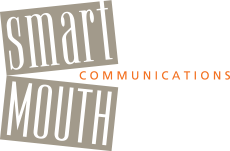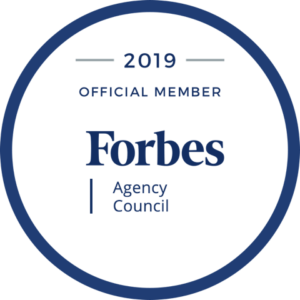SmartMouth Talks!
A Sense of Proportion
For some reason, even the smartest, most seasoned professionals lose all sense of perspective and proportion – e.g. time, place, purpose – when they have to make a formal announcement. I have seen the mere suggestion that someone needs to make a statement, or hold a press conference, or speak at an event escalate into nothing short of the need to draft a new version of the Gettysburg Address.
For example, I recently had a client who was asked to make brief welcoming remarks before dinner to a visiting industry group. Knowing full well there would be other presentations during dinner that evening, this client and his handlers still came up with a full-blown speech that not only welcomed everyone, but addressed and empathized with the biggest challenges facing that particular industry. It was meant to be meaningful for the audience, but it was also long, philosophical, and dissertation-like. Great stuff for a keynote speech, but way overboard for “brief welcoming remarks.” I offered to help, and we cut his remarks back to be much shorter and somewhat more entertaining. He still empathized with the industry for its woes, so he was relevant, but he did it in story format, using some lighthearted humor, which gave it a less formal and more conversational feel. In the end, it was much better suited to a welcome!
Another example was a client in the early stages of a multi-year project to build a new, much-anticipated state-of-the-art facility. At the point in the design process when the client was due to announce the selection of the firm that would create the look and feel of the interior space, I caught wind that the executive in charge was planning to say this: “Today is the culmination of 10 years worth of dreaming and planning and hard work by many. We are so proud and thrilled . . . ” Huh? Really? To see if I could awaken this client to a sense of proportion, I gently asked, “um, so, like, what will you say at the ground-breaking when construction begins, or at the ribbon-cutting for the grand opening? Don’t you want to save the 10-year dream-come-true theme for one of those occasions?”
Here are three tips to help you keep it all in perspective and maintain a sense of proportion:
1. Think about the audience and the occasion. Why is the audience in the room and what do they care about, want, and/or expect?
2. Know your role for the occasion. Are you the only speaker or one of many speakers? What specifically were you asked to do?
3. Know your “job” for the occasion. Are you introducing, informing, inspiring, entertaining? What verb describes your primary communications task for the occasion?
You’ll be just fine if you keep the audience in mind, stick to your assigned role, and do your “job” – nothing more, nothing less!
So True of Communicating . . .
“When you do the common things in life in an uncommon way, you will command the attention of the world.”
– George Washington Carver
Let’s Bite Back!
The ‘sound bite’ has taken such a bad rap, and I want to wage a campaign on its behalf!
For a while now, the sound bite has been right up there with ‘spin’ in terms of its public image, but even spin is unfairly maligned. Former Clinton White House spokesperson Mike McCurry called spin “a self-interested selection of facts.” What’s wrong with that? The sound bite is pretty straightforward and, like its name suggests, is basically a bite of sound, or a few digestible words. That – in this world of long-winded-information-dumping speakers and presenters – is a good thing!
As communicators, we do not need to be defensive or apologetic about either one – spin or the sound bite. Instead, it’s our challenge to use them well!
Q: What’s the most important thing leaders do all day? A: Talk!
You are in a leadership position, therefore you are a professional communicator.
People depend on you. Opportunities depend on you. Success depends on your ability to communicate well.
Whether for internal or external audiences, and whether for routine or extraordinary circumstances, your communications matter . . . a lot!
Talk better. Visit http://smartmouthgroup.com/events.htm to learn more about my Leadership Communications Seminar on November 6th.
Quote of the Day
“The mind is a wonderful thing. It starts working the minute you’re born and never stops until you get up to speak in public.”
~ Roscoe Drummond, Washington Columnist
Listen to Your Mother . . . Everything You Need to Know About Making a Presentation You Learned Years Ago
Your mother really did have your best interests in mind. Her nagging reminders may have seemed repetitive or unnecessary at the time, but they may actually be some of your best tips for making an effective presentation.
Here’s a quick review of your mom’s best reminders. Think about how you might use them to run a better staff meeting, deliver a better speech, conduct a better sales call, or just make a better impression in your business life.
Use your head. Think before you talk. If you have the benefit of even a little bit of time to plan and prepare ahead, it will serve you well. Think in advance about your audience, think about your objectives, and think about what you want to convey. Write it out in long form, if you need to, or jot down bullet-pointed message points. Being prepared will give you the confidence you need to deliver the substance of your message in the most effective manner.
1 + 1 = 2. Keep it simple. Make sure what you are saying is clear, easy to follow, and that it makes sense. Be aware that your audience, no matter how big or small, has a limited attention span. They may or may not be interested in, or able to sit through, a long narrative full of details or complex information. Follow this simple equation: Tell them what you’re going to tell them; then tell them; then recap by telling them what you told them. And keep it simple.
Don’t exaggerate. Tell the truth, stick to the facts, and – above all – talk only about what you know. Venturing to guess, speculate, or hypothesize is like stepping into verbal quicksand. You may never be able to pull yourself back out, and you’ll just find yourself sinking deeper and deeper. Sticking to what you know keeps you in control of your message and makes for a more commanding delivery.
Stand up straight. Good posture, whether you are sitting or standing, not only looks better, but also enhances your ability to breathe, which is critical to your ability to speak well. Standing up straight also bolsters your presence and gives the impression that you’re in charge, which ultimately gets you the attention you need and deserve.
Slow down. Take your time. It’s okay to breathe, to pause, to take a moment and collect your thoughts. This is particularly important when you are faced with spontaneous questions, as you might be in a media interview or during the Q&A portion of a presentation. If you happen to be at a podium with a microphone, speaking slowly and clearly avoids audio feedback and ensures that your audience is able to hear every word of your presentation.
Stop fidgeting. Take your fingers out of your mouth. Don’t play with your hair. Quit twirling your ring. Find someplace for your hands, whether it’s holding a pen, a pointer, or your papers. Or you may just want to fold them in front of you. Bob Dole always spoke holding a pen in the hand of his disabled arm to avoid having that side look weak or unusable. For many of us, holding a pen during a presentation provides a similar supporting benefit, in that it gives our hand or hands something useful to hold onto.
Remember your manners. Be gracious. Remember to say please, thank you, and excuse me, when appropriate. If you have been invited to speak or make a presentation, remember to thank your hosts and acknowledge any co-presenters.
Wait your turn. During Q&A sessions, or on panel discussions, the urge to interrupt or speak over someone can be overwhelming when there’s an important point to be made. You must wait your turn, though, no matter how urgent your point or counterpoint. You might think you politely cutting in, but you run the risk of the audience remembering the act of your interruption more than the content of your point.
Don’t overstay your welcome. If you are invited to speak, be sure you know how much time you have, and stick to it. If you are speaking in a more open-ended forum – such as conducting a meeting or being interviewed by a reporter or making a new business presentation – remember that less is more. Be succinct.
Work on knowing what points you need to get across, work on making them powerful, and then work on stopping. Be aware that most people have short attention spans, so your window of opportunity for making a point is usually quite limited.
Do your best. In the end, this is all you can ask of yourself. And, it’s all your mother ever asked of you too.



